► Electric hot hatches do exist in 2025
► These are our favourite pocket rockets
► Read our full reviews for more information
We’re calling it now: in 2025 the electric hot hatch has arrived. Leaps and bounds in battery and motor technology mean there are now several cars that we’d class as hot hatchbacks on the EV market. That’s right, after countless reveals of electric SUVs, SUV fastbacks and mid-sized crossovers, manufacturers are starting to make compact electric cars that are both quick and engaging to drive.
To be clear, if you’re expecting pops, bangs and lift-off oversteer, we’d recommend looking elsewhere. That’s because electric hot hatches don’t provide the same experience as their ICE counterparts, but an altogether new one: they’re more like heavy go-karts that defy physics with supercar-worrying torque.
After hours and miles of rigorous testing – including months on our long-termer fleet – here are the best electric hot hatches you can buy in 2025.
The best electric hot hatches on sale in 2025
Abarth 600e
Best for limited-slip diff magic and cool colours
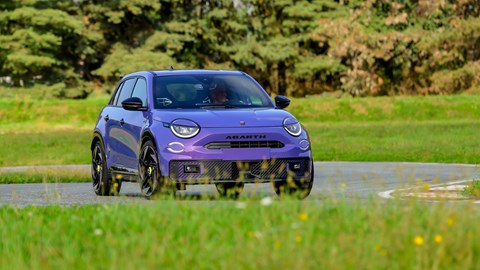
Pros: Aggressive looks, strong performance, likeable character
Cons: Poor range, base model interior feels bare
Abarth’s 600e is one of the newest electric hot hatches on the market, but it’s already one of the best. Coming in two trims, 237bhp or 278bhp, it can go from 0-62mph in as quick as 5.85 seconds – but it’s about a lot more than just straight-line speed.
Abarth’s engineers have tweaked the chassis, steering and brakes to give the hottest 600e available far more performance and precision in the twisty stuff. Combine it with a clever JTKEKT limited-slip differential, and it also has great traction for punching out of corners. There’s hardly any torque steer either, which is very unusual for a hot hatch.
Inside, the 600e is relatively charming and thanks to a bold body kit, it certainly has more presence than its Fiat sibling too. Our only issues? Its 200mile range isn’t that competitive and could be lower in the real world. In addition, the interior in the cheaper model is pretty barren.
Find out more in our full Abarth 600e review
Also try: the Alfa Romeo Junior Veloce, which also puts out 278bhp and uses the same LSD as the Abarth.
Cupra Born VZ
Best for electric fun from the VW Group
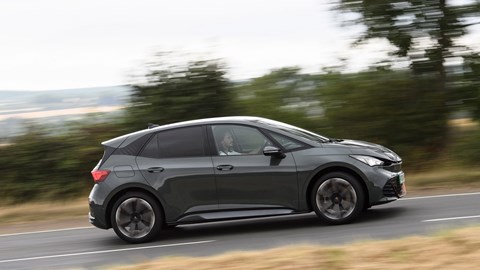
Pros: Premium looks inside and out, fast, direct steering, lots of fun
Cons: Brakes could be better, why wasn’t the regular Born this good?
The standard Cupra Born styles itself as a more premium, exciting version of the Volkswagen ID.3 – but the VZ is the car it should’ve been all along. The specs tell half the story: power increases from 227bhp to 322bhp, torque swells from 229 to 402lb ft, and the VZ’s 5.6 second 0-62mph time is a second quicker than standard, too. Top speed meanwhile creeps up from 99mph to 124mph.
The other half of the story comes in the form of significantly improved driving dynamics. The steering is more precise, more direct and offers more feedback – while the Born VZ’s brakes are easier to modulate than before. Simply put, the point at which regen moves over to physical braking has been significantly refined.
The result is a car with enormous grip, and one that inspires confidence and asks to be hustled at every corner – whether you’re in the mountains of Barcelona where we first tested it, or back home in the UK. Just as well, then, that the interior’s new Sabelt sports seats are both comfy but also supportive when pushing on.
To find out more, read our full Cupra Born VZ review
Mini Cooper SE electric
Best for performance and looks, Mini style
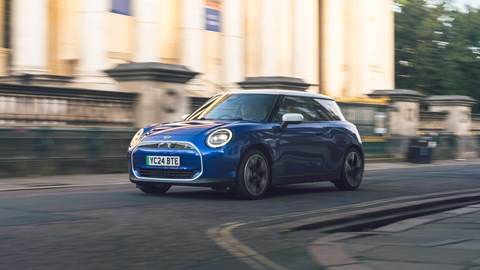
Pros: Classic looks get updated, nippy performance, Go-Kart mode is fun
Cons: Very little
Unlike its predecessor, the Mini Cooper Electric was designed from the ground up to be an electric car, and it’s all the better for it. We’ll get to the design later, but first the performance: the Cooper SE’s 215bhp is good for 0-62mph in an Abarth-beating 6.7 seconds. And as with all EVs, that figure doesn’t really describe the feeling of electric slingshot speed to 30mph.
The Cooper SE handles well but isn’t skateboard stiff like some other EVs. Munich’s engineers have tuned suspension that walks a fine line between relaying information about the road and being fidgety – and in practice it’s an ideal balance.
Better still is the premium interior, which looks to the future but with the style you’d hope for from a Mini. A highlight of our Cooper SE long-termer has to be the Mini’s Go-Kart mode. It replaces engine noise with a Star Wars-style propulsion sound, and even makes a pleasing alternative noise for energy regen.
To find out more, read our full Mini Cooper SE review
MG 4 XPower
Best for supercar straight-line speed to the masses
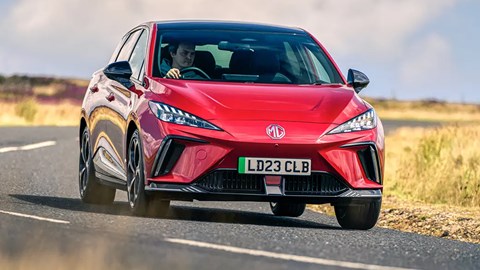
Pros: Great value, eye-watering speed
Cons: Interior quality is basic, body roll is pretty intrusive
The MG 4 has emerged as one of the best-value EVs on the market, so it’s only right that its performance version is one of the most impressive hot hatches. At its heart the MG XPower formula is simple: add another electric motor for even more thrust.
The result is impressive on paper: 429bhp of power, 443Ib ft of torque and a top speed of 124mph. But the headline figure? That’s 0-62mph in just 3.8sec – which is very much knocking on the door of supercars.
Don’t expect the handling or poise of a finely-honed thoroughbred though; we found more roll and less body control than you might expect for something so fast. The steering is a touch on the heavy side and the interior isn’t too premium either. Then again, at just £36,495 the MG 4 XPower is something of a steal…
To find out more, read our full MG 4 XPower review
Abarth 500e
Best for Fiat 500 cuteness with serious performance
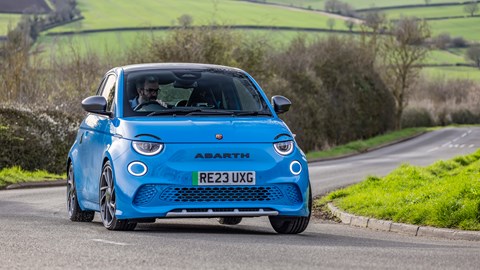
Pros: Good looks, relatively nimble, fun, slingshot handling, cheap secondhand
Cons: Very short range owing to small battery
Abarth’s version of the Fiat 500e city car uses the same 42kWh battery, but power goes up from 117bhp in the Fiat to 152bhp here. The Abarth version of the Fiat 500e has a more powerful motor, a butch bodykit and a smattering of engineering changes to go with the go-faster looks. A 0-62mph sprint of 7.0sec is around a second slower than an Abarth 695, but Abarth claims it’s ‘quicker where it matters.’
Our long-termer impressed us, with its athletic looks and zippy performance. It’s just really fun to drive – a hoot through corners and its performance is well judged, letting you exploit all that power in everyday driving conditions. Less impressive is the EV range: at 158 miles, it’s one of the lowest here – and we rarely managed more than 110 miles in real-world conditions – so longer journeys will require meticulous planning and frequent charging.
The Abarth 500e’s style and panache come at a price; the retail cost for a new example start at almost £40k, but that drops to around £23k on the used market for a year-old example with fewer than 10,000 miles on the odometer.
To find out more, read our full Abarth 500e review
Hyundai Ioniq 5 N
Best for family-friendly space and supercar performance
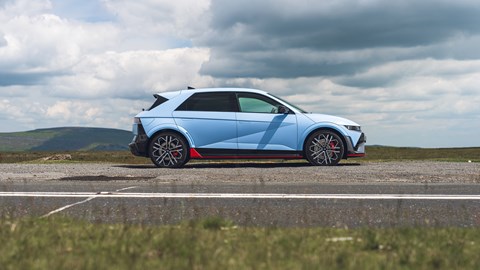
Pros: Retro-modern looks, supercar performance, lots of interesting tech
Cons: Not actually a hot hatch at all…
The Hyundai Ioniq N is pushing the realms of being a hatchback (it’s so big, it nearly qualifies as an SUV), but it gets a mention here for its deceptive, hatch-alike looks and physics-bending performance. Hyundai’s designers have done their best to make it look like a futuristic hybrid of a DeLorean and a Golf GTI, when in fact it’s the size of a medium-sized crossover.
Still, despite the size it can move with deceptive ease: two e-motors make 641bhp and 546lb ft of torque for a 0-62mph sprint of just 3.4 seconds, while a tonne of chassis management keeps the actual tonnes in check when cornering. We’ve driven it on the road, but also tested it around Brands Hatch and found it to be pretty nimble despite its 2.2-tonne kerbweight.
It looks like a classic hot hatch too: lowered and covered in vents, louvres and diffusers – and most of them are functional. The Ioniq 5 N is 20mm lower and 50mm wider to make space for some girthier tyres (275/35 21-inch Pirelli P-Zeros) and the stance is just perfect. Even its N seats are 20mm lower, connecting you with the driving experience in a very authentic way.
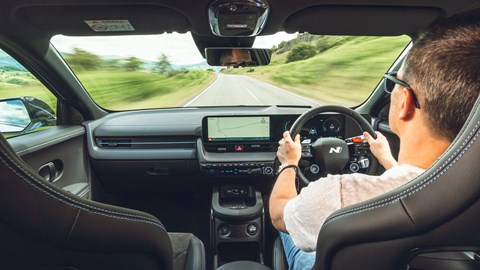
Inside, there’s a range of tech and some interesting performance-focused features. Find the N menu on the infotainment screen and you can tweak the settings of the electric motors, steering weight, damper stiffness, electronic limited-slip differential and more.
Hyundai’s N e-Shift function is worth a special mention: it turns the paddles behind the wheel – usually used to adjust regen settings on EVs – into ‘gearshift’ paddles that cycle through a software-only eight-speed DCT transmission, letting you ‘rev’ up and down through virtual gears. Sounds naff, works brilliantly.
To find out more, read our full Hyundai Ioniq 5 N review